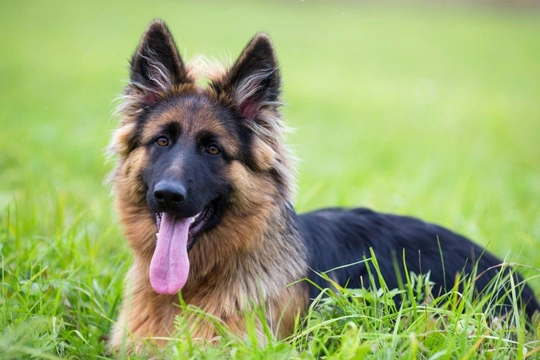
What makes the German shepherd such an enduringly popular dog breed?
The German shepherd is a dog breed that virtually everyone in the UK can recognise instantly, even taking into account the wide range of colours and coat lengths that dogs of the breed can possess.
They’re a breed that has been enduringly popular in the UK for generations – and they have been a common sight on the streets and in dog parks around the country for many decades. Even when anti-German sentiment in the UK was high after the Second World War, the popularity of the breed remained high – although they went through something of a re-brand to try to provide some distance from their German origins around that time, being more commonly known as Alsatians for a few decades.
Today, the German shepherd is the UK’s second most popular large dog breed (after the Labrador retriever) and the ninth most popular dog breed overall. If you are considering buying a German shepherd as a pet, or are simply wondering why the breed is so consistently popular in the UK, we will answer your questions within this article. Read on to learn more.
What is a German shepherd?
The German shepherd is a large dog breed that falls within The Kennel Club’s pastoral dog grouping, and they have a very traditional appearance that is all business, and that maintains a lot of similarities in conformation and build to their wild wolf ancestors.
The breed of course originated in Germany, where they were historically used as livestock guarding and herding dogs, later becoming highly prized and much in demand within other working roles including guarding, watchdog duties, and as police and military dogs too.
Their versatility and high intelligence led to the breed being widely exported across the world, and they are still commonly found serving in working roles today as well as of course being very popular as pets.
The breed has also evolved a lot from their traditional appearance over the last half a century and today’s German shepherds tend to have a much greater degree of sloping along their backs to their hindquarters than their ancestors. Additionally, the longhaired German shepherd coat variant that was originally considered to be a breed fault and not recognised within the breed standard is now also an accepted variation of the breed.
The core traits of the German shepherd breed
The German shepherd is a very large dog breed, standing up to 65cm tall at the withers and weighing up to 40kg. They are not among the most low maintenance of dogs to own either, needing a lot of exercise and also regular grooming to keep their coats in good condition. They also tend to be heavy shedders, so investing in a good vacuum cleaner is essential to successfully living with a German shepherd!
The breed’s intelligence is also up there at the top of the charts, and it is this intelligence that makes them such a good fit for a wide and varied range of working roles. They are very loyal dogs that form strong bonds with their handlers, but they tend to be slightly reserved with strangers and can take a while to warm up to people they don’t know.
They are naturally a very alert, watchful breed that will actively patrol their territory and alert you of other people or dogs approaching, and see off any undesirables who might try to break into your home! When it comes to deterring crime, the business-like, switched-on German shepherd is unmatched, both thanks to their imposing physical appearance, fearless nature, and tenacity.
However, they are not by any means an aggressive or unpredictable breed, and they look to their handlers for direction and are excellent at obeying commands even in high-stakes situations.
Why is the German shepherd so popular?
For people who have their hearts set on owning a large breed dog, the German shepherd is certainly worthy of a second look. Their loyalty, tenacity and deeply affectionate temperaments soon capture the heart, and once you have earned a German shepherd’s trust, it takes a lot to shake it.
They are bold and fearless and don’t tend to be easily startled or discouraged, and they like to stay active, which makes them great dogs for people who like to walk, hike or jog, or who are interested in taking part in canine sports.
Their high intelligence and problem-solving abilities ensure that they can be taught a wide range of commands and follow them to the letter, and they are a pleasure to work with for experienced, insightful trainers who can account for the dog’s intelligence and need for exercise, and work this into their daily routines.
They are also undeniably very good-looking dogs, and can be found in a wide range of colour and coat variants – and few dogs can turn heads as quickly as a large, longhaired German shepherd, particularly those rare specimens with a snowy-white or all black coat!
How much does it cost to buy a German shepherd?
Given the size of the German shepherd, they are not overly expensive to buy – registered pedigree dogs of the breed change hands for around £846 on average, whilst unregistered or non-pedigree German shepherds can be purchased for around £613.
However, the costs of caring for a German shepherd can be rather more daunting – as a big, tall dog breed, they eat a lot, and require everything in large size – and the cost of insuring them and covering the cost of veterinary care including spay and neuter surgeries and flea and worming treatments tend to be higher than for smaller dogs too.



